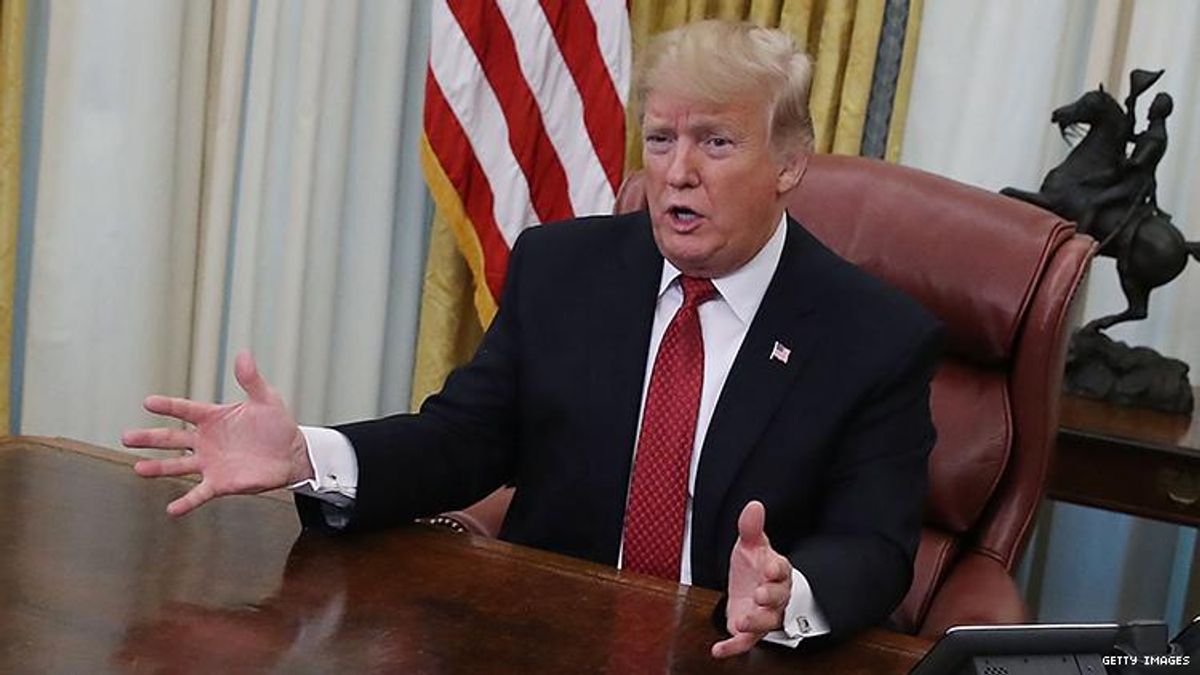News & Opinion
Op-ed: Trump Can’t End an HIV/AIDS Epidemic He Doesn’t Understand

Expect the epidemic to go unabated if we don’t talk about the structural issues.
February 06 2019 8:21 AM EST
February 07 2019 9:37 PM EST
By continuing to use our site, you agree to our Private Policy and Terms of Use.

Expect the epidemic to go unabated if we don’t talk about the structural issues.
During Tuesday night's state of the union, Trump floated several ideas ripped straight from the uninformed corners of internet. He claimed that undocumented immigrants bolster crime rates (they don't) and touted that America's opioid crisis is due to our lack of a border wall (it's not!). But when Trump wasn't striking a divisive tone, he attempted to inspire Congress and the nation with humanitarian calls to lower the price of prescription drugs, instate paid family leave and end the U.S. HIV/AIDS epidemic by 2030.
Each of these policy proposals were surprising for many to hear, but for AIDS activists, Trump's sudden attention to the ongoing HIV/AIDS epidemic was particularly suspect. ACT UP preempted Trump's announcement with an Advocate op-ed denouncing the commander-in-chief as someone who "doesn't care" about HIV. And who could blame them?
After President Barack Obama announced the first national strategy to fight the HIV/AIDS epidemic domestically, Trump neglected the still-raging epidemic, which continues to affect Black queer people, trans women, sex workers, drug users and incarcerated people. Despite the 1.1 million people living with HIV and over 38,000 new HIV infections in 2017, Trump failed to name a director of the Office of National AIDS Policy and prompted six members of the president's advisory council on HIV/AIDS to quit in protest. The remaining members were fired via FedEx. And his apathy extended abroad, as well. Trump proposed cutting PEPFAR, the popular, successful, multi-billion dollar initiative meant to fight HIV/AIDS around the globe.
But Trump's seeming public health 180 isn't exactly the change it seems to be. Though his words contained few specific policy proposals, early reports of the president's plan focus on a specific tool as a means to end the epidemic: condoms. Yes, condoms are an important part of the fight against HIV/AIDS and should be one of a number of options available to those who wish to stay HIV negative, including pre-exposure prophylaxis, post-exposure prophylaxis, and needle exchanges for people who inject drugs.
But Trump's insistence on condom use underscores a larger issue with his policy proposal: it fundamentally misunderstands the country's HIV/AIDS epidemic. If one-on-one (or, you know, one-on-two, or two-on-two, or more) sexual encounters are the lynchpin of Trump's AIDS proposal, then the policy is already DOA. Focusing on individual behaviors rather than systemic disparities dooms Trump's plan to fail -- and shows that his plan might be more rhetoric than focused on results.
The truth is, focusing on behavior will not result in curbing the epidemic, especially if the plan is throwing condoms as a problem we've been throwing condoms at for four decades. Instead, any policy about AIDS has to recognize that the disease is may be transmitted by sexual activity (among other ways), but is caused by structural inequality, especially racism, sexism, homophobia and economic inequality.
In Anti Black Racism and the AIDS Epidemic, researcher Adam Geary writes that "the color of AIDS in America is Black." Geary goes on to note that nearly half of those living with HIV in the United States are Black and account for nearly half of new infections each year, despite only being around 12 percent of the US population.
Trump used his time at the podium to point to individual Black people who were helped by a bipartisan prison reform and to make the (misleading) claim that his policies bolstered Black employment to levels never seen. And yet Trump is still the "tough on crime" president who has called for tougher policing tactics and a more widespread use of unconstitutional stop-and-frisk tactics to identify Black and brown youth to usher into the American incarceration system. Incarceration is a major factor in the US HIV/AIDS epidemic and advocating "tough on crime" policies worsen the epidemic.
Aside from racism, economics plays a major role in whether or not someone might acquire HIV. Given that Trump has tried again and again to ban transgender people from the military -- AKA ban them from economic opportunities -- Trump has put even more transgender people, already a group of people highly vulnerable to HIV, at risk.
Despite Trump saying that he wants to help those with pre-existing conditions -- like HIV! -- during his speech, he has worked tirelessly to dismantle the Affordable Care Act and his administration is currently locked in a federal court battle to declare the ACA's pre-existing conditions clause unconstitutional. The results would be disastrous. If people with HIV were denied insurance, it's not hard to imagine that they would then fall out of care and HIV treatment, especially in areas with fewer social safety nets for HIV-positive people. First, that would be disastrous for those living with HIV. Second, less HIV treatment means more treatment overall. At this point, the scientific community has reached a consensus that HIV-positive people who are in treatment and become undetectable (the level of virus in their blood is miniscule) do not transmit the virus. Period.
Trump's speech wants you to believe that the end of AIDS is within reach solely if we treat it as a sexual epidemic. That is wrong. While treatment and HIV science are better than ever before, social conditions have yet to catch up. The fight against HIV cannot comprise of condoms and pills alone -- it must include systemic solutions that foster environments where the virus cannot thrive.
Trump didn't just demonstrate that he doesn't understand the epidemic. He demonstrated that he doesn't care to understand.
Related | Trump Outlines Plan to End HIV by 2030 In State of the Union